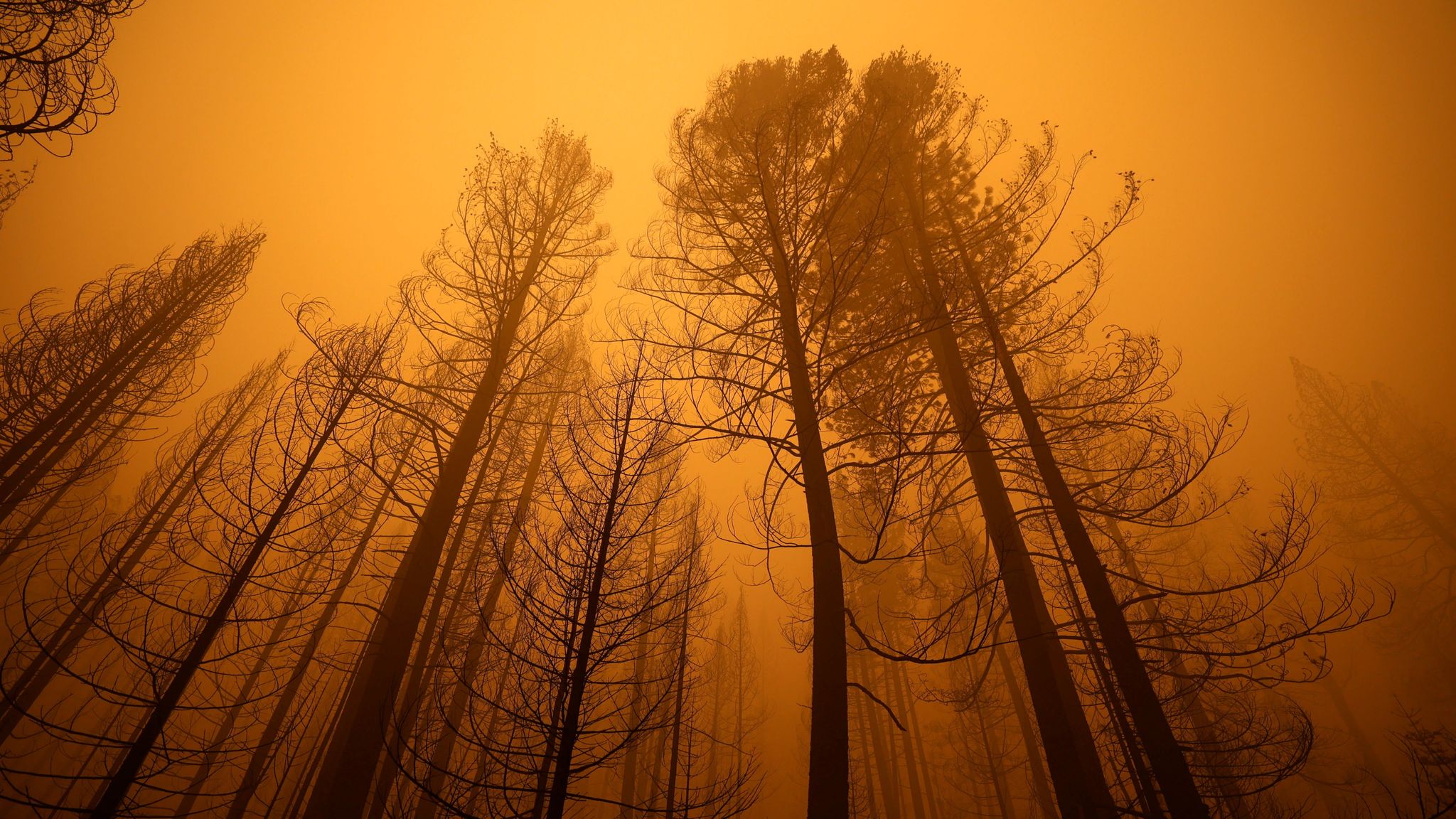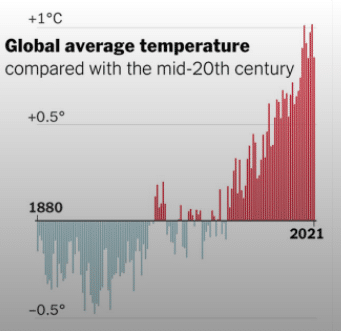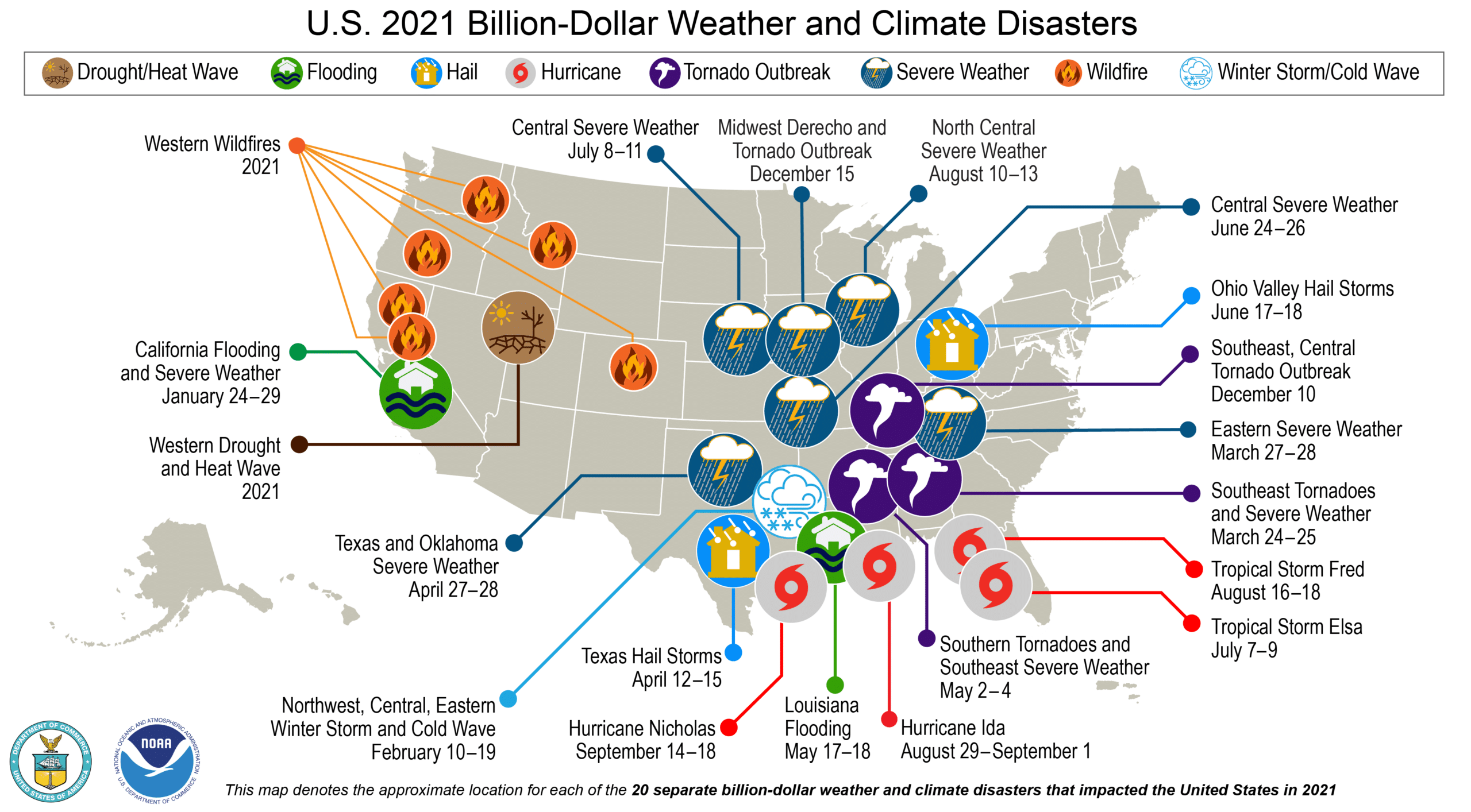Another Hot One: 2021
January 18, 2022 by
 It’s official: 2021 was either the fifth or sixth hottest year on record, depending on who you ask.
It’s official: 2021 was either the fifth or sixth hottest year on record, depending on who you ask.
On January 13, NASA and the National Oceanic and Atmospheric Administration (NOAA) issued reports saying that 2021 was the sixth hottest year ever recorded, going back to when record-keeping began in 1880.1 Earlierin the week, the Copernicus Climate Change Service, whose researchers are based in the European Union, released its own analysis, calculating 2021 temperature records to be the fifth hottest history.2 Although there are variations in the rankings based on how the averages were calculated, the overall data still align and reach the same conclusion: 2021 was yet another hot one.
This distinction comes as no surprise to climate scientists, whose analyses have shown that global temperatures have continued to break records in recent years. The year 2020 tied with 2016 as the hottest years, according to NASA.3 NASA’s data shows that “Earth’s average temperature has risen more than 2 degrees Fahrenheit (1.2 degrees Celsius) since the late 19th century” and that human activity—namely greenhouse gas emissions—is the root cause of this change.4
 This is part of a broad trend of record-breaking temperatures. The previous seven years have been the seven hottest on record.5 And according to the NOAA, July 2021 was the single hottest month ever recorded.6 NOAA administrator Rick Spinrad characterized this data as a continuation of “the disturbing and disruptive path that climate change has set for the globe.”7
This is part of a broad trend of record-breaking temperatures. The previous seven years have been the seven hottest on record.5 And according to the NOAA, July 2021 was the single hottest month ever recorded.6 NOAA administrator Rick Spinrad characterized this data as a continuation of “the disturbing and disruptive path that climate change has set for the globe.”7
The effects of climate change can be seen around the world in extreme heatwaves, droughts, wildfires, and other severe weather events such as storms, hurricanes, and tornados, which increase in strength and frequency due to warmer temperatures. “We do not live in a stable climate now,” said Robert Rohde of Berkeley Earth, an organization focused on climate science. “We will expect to see more extremes and more all-time records being set.”8

U.S. 2021 Climate Crisis and Billion-Dollar Weather
This fall, the United Nations Climate Change Conference, known as COP26, met in Glasgow in what its organizers dubbed the “last, best hope to save the planet.”9 It ended with an agreement between more than 200 countries to come back in a year with stronger, concrete plans on how to mitigate the effects of climate change and the recognition that wealthier nations need to increase their funding for these efforts.10 There was also consensus about the urgency of the issue and ongoing conversations about what should be done, such as curtailing methane emissions and ending deforestation.11 However, nations disagreed about how quickly they need to reduce emissions and by how much—information that is vital to address climate change on a global scale.12 Nineteen-year-old environmental activist Greta Thunberg criticized the apparent lack of action in a tweet: “The #COP26 is over. Here’s a brief summary: Blah, blah, blah.”13
Discussion Questions
- Have you seen or experienced any effects of climate change in 2021?
- On a scale of 1-5 (with 1 being “not important” and 5 being “extremely important”), how important is the issue of climate change to you and your community?
- How seriously do you think elected leaders in the federal government take the issue of climate change? In your state or local government?
- Considering the enormous scale of the issue, how do you think the U.S. government should respond to climate change?
As always, we encourage you to join the discussion with your comments or questions below!
Sources
Featured Image Credit: Sky News
[1] Los Angeles Times: https://www.latimes.com/environment/story/2022-01-13/2021-was-earths-6th-hottest-year-nasa-and-noaa-say
[2] New York Times: https://www.nytimes.com/2022/01/10/climate/2021-hottest-year.html
[3] NASA: https://www.nasa.gov/press-release/2020-tied-for-warmest-year-on-record-nasa-analysis-shows
[4] Ibid.
[5] New York Times: https://www.nytimes.com/2021/11/13/climate/cop26-climate-summit-takeaways.html
[6] NOAA: https://www.noaa.gov/news/its-official-july-2021-was-earths-hottest-month-on-record
[7] Ibid.
[8] New York Times: https://www.nytimes.com/2022/01/12/climate/nyt-climate-newsletter-temperature-records.html
[9] New York Times: https://www.nytimes.com/2021/11/13/climate/cop26-climate-summit-takeaways.html
[10] Ibid.
[11] Ibid.
[12] Ibid.
[13] Twitter: https://twitter.com/gretathunberg/status/1459612735294029834?lang=en







